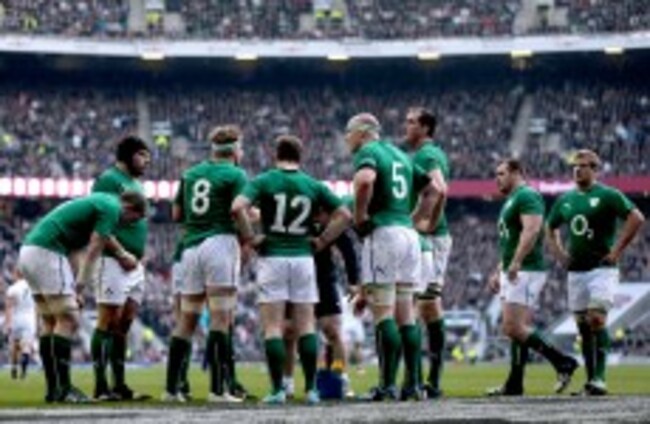NEVER BEFORE HAS an Irish side mastered the basics of the game so well. They have the best maul in the competition and on current form the lineout is comparable to South Africa’s.
Wales, New Zealand and England have been contained in the scrum, the back up front row are young and dynamic, and the defensive patterns look rock solid. Teams have reached World Cup finals with less going for them.
At the same time the offloads have dried up, the back three aren’t connecting as an offensive unit and counter attacking plays are almost non existent. Elsewhere, players have missed clear overlaps and the wingers don’t look dangerous when in space.
If you were told a year ago that Joe Schmidt would be managing an Irish team that’s brilliant at the basics but isn’t attempting the delicate stuff you would assume the players had gone off message.
Considering the way Auckland, Clermont and Leinster played under him, its unlikely Schmidt is telling them not to try things, so the only conclusion can be that the players are following the brief too rigidly.
There have been lots of advantages to that obedience so far in the tournament. They have given teams very few chances, they’ve scored tries straight from the training ground and everyone is clearly buying into the system and gaining confidence from following the plan.
Ireland are now well organised, ruthlessly efficient and will be in with a chance of winning every game they play, irrespective of opposition. The problem is, they’re still losing against the really good teams, and that’s down to a lack of spontaneous moments.
There has been the occasional individual burst, such as Kearney’s footwork and finish against Scotland, but rarely have the players combined to put each other into space. That may seem overly critical given how well they’ve played at times, but until the players feel the flow we’re unlikely to win a run of tough games, which is the only way to reach a World Cup semi final.
The lack of offloading is the strangest thing about this current side, especially considering the way Leinster played last year. The counter attacking and overlaps may come down to vision or new personnel in certain positions, but a small team will usually try to offload or make short lateral passes rather than take full contact.
Brian O’Driscoll got criticised in some quarters for over complicating things, but in the final 20 minutes he looked the most dangerous back, and was the only one attempting to disguise his intentions. If the switch pass to Sexton had come off, they would have been in a really threatening position. For some reason it was only when the game looked beyond them that they tried to get it going. One of the few clear attempts on Saturday came from Sean Cronin, the replacement hooker, who knocked the ball on as he tried to get his hands free. At that stage the pressure on execution was probably too great.
Fans aren’t too sure what sort of expectations to have at the moment, and that is tied in to the inconsistency over the last few years. Since November every game has been encouraging, besides Australia. Ireland led 10-3 in the second half against England, led NZ by 19 points and hammered the Six Nations defending champions. Then again last season was the worst since Italy joined (2000), so supporters must be wondering if its greedy to ask for a championship straight away.
Ireland shouldn’t lose to Italy, so the focus over the next week and half will be on points differential, staying fresh and keeping some rehearsed moves in the locker for the trip to Paris.
Against the weakest team in the competition there should be time for some off the cuff moments, and players will have the luxury of knowing all moves don’t have to succeed, which is a good way to get this thing rolling. So far the plan has been followed, and the plan is a good one, but the next step has to have a sprinkle of spontaneity to it.
You can follow Second Captains on Twitter here.












If anybody told me this time last year that we’d be as effective a team as what we are now then I would have laughed!
Plumtree and Foley deserve huge credit for the quick development of set piece and general forward cohesion. When you consider we have no O’Brien and are playing with two wingers who are exceptionally honest and hard working but not many people’s first choice and have just lost by 3 to a team with a incredible defensive line and spirit to match, then again, I’ll accept where we are for now.
Schmidt is building for next year and in my view is ahead of his target. Back line play will develop on the confidence our forwards are generating for the team through their dominance this year! We need to put 40+ on Italy and beat France up front. Championship in the bag if we can do that. I believe we can.
Why does Foley deserve credit??
Some zebo magic
I remain overwhelmingly positive. Already Schmidt’s Ireland are a much more effective side than the team kidney left us with. The fact that were top of the championship table says it all.
When Kidney had a fully fit team last year we went to Cardiff and won. The basis of a good team was always there – we were crucified by injuries last year.
That’s true. You’d forget how bad the injuries were. At one stage we had O’Brien hooker, O’Driscoll scrum half and O’Mahony on the wing for parts. If we go back as far as 09 we were very lucky with injuries. Think Kidney takes far too much blame.
Well I think it’s fair to say we have been unlucky enough with injury’s this year as well, your very rarely going to get a Championship such as 09 where you have such a clean bill of health. I think one of the most valid criticisms of Kidney was that during his tenure the camp became stale and he failed to achieve any depth in the squad or competition for places, this is an issue that led to us being so devoid of options when our major players got injured. Where one would think Joe Schmidt might in the long term achieve success for Ireland is in developing the kind of competitive environment where you can be missing some of your top players and still have the quality to compete with the top teams, this is one area among others where I think the Kidney regime failed in the long term for Ireland, but nobody can deny him the Grand Slam success of 09.
Not showing too many signs of that yet. Practically same 15 throughout his tenure so far. Injuries excepted.
It would be hard to disagree, with the exception of coarse of playing Marshall against Scotland, however I do think that in a 6 nations perhaps only Scotland and Italy are seen as a chance to blood young talent and give different players opportunities, so we can reserve judgement until we see the team named for the Italian match. It is for this reason I wouldn’t be too critical of his constant selection so far, as its a fine balance between unstable chopping and changing and building a competitive squad environment, although if we are saying that he has been picking the same 15 every game this time next year it would be fair to worry that he has fallen into the same short sighted trap as his predecessor. In saying that I have every faith in Joe and feel his tenure has gotten off to a quietly impressive start so far.
We need Henderson in for Toner for a bit of a Gain-Line player that we miss when O Briens out. Marshall offers more in attack than D’Arcy, so he should be in too. Also, Maybe Zebo in for Dave??
I’d agree with Marshall and Zebo in, and normally would agree with Henderson but I think Toner (I’ve never really been a fan) has earned a bit of a run.
I agree but I’d bring in Henderson for POC. He needs a break anyway and toner is capable of calling the lineout. I’d bring Ryan into bench also. Zebo and Kearney on wings , Marshall at 12 and bod as captain at 13. I’d also start Moore to have a look at him early in a game. The zebo thing has no chance of happening. Saint Joe doesn’t like his social profile but is afraid to say so hence he keeps moving the goalposts on poor zeebs.
Toner made 15 tackles last week and managed a few meters carrying POC made 6 tackles and no meters carried. Toner is a pretty handy 19 stone of a second row. No he is not a O,Connell but they are a well balanced second row.
We lost because their half backs played better then ours and looked after their ball a little better. The only thing really needed is a few changes to the players that maybe carrying a knock or two. Maybe one of two outside backs who have a little more pace
Scrum yet to be given a proper workout in 6N, both Wales & England were without first choice props and/or props short of game time; lets judge them against SA’s standards when they actually play them
Why do we need to test ourselves against SA?
Are they the best!?
Maybe…
Are we going to be playing them soon? No
You can only beat what’s in front of you….
Or not
The author made the comparison btw
Best missed 5 tackled according to the stats. That is unforgivable at this level.
BOD should be dropped. Not a hope of it happening but, legend and all that he is, he is miles from a test centre these days.
Zebo is a no brainer as well.
Joe was lucky to have so many games at home to start really. If we don’t win in Paris against a poor French team …
Potential Ireland Squad to face Italy:
1. Healy 2. Best 3. Moore
4. POC 5. Toner
6. O’Mahony 7. Henry 8. Heaslip
9. Murray 10. Sexton
12. Marshall 13. O’Driscoll
11. D. Kearney 14. Trimble 15. R. Kearney
16. McGrath
17. Cronin
18. Ross
19. Henderson
20. Reddan/Boss
21. Jackson
22. Zebo/Fitzgerald
There is so many tight calls, Henderson could start if Schmit wants to rest POC (aka the zombie from I am legend) but doubt this will happen and fair enough, POC is so valuable. Although, we managed okay against Scotland without him so why not Italia. He could also put Henderson in the back row as he normally plays on the flank at Ulster and is much more effective there. Personally, I would start Henderson.
Zebo is becoming the Scores application of Godwin’s Law.
Henderson played at 5 for Ulster on Fri night and played well, I think he will start on Sat to rest poc for Paris, also I think Moore will start for first time, team struggling for centres now and long term , noticed mc fadden played there for Leinster last night, maybe he could be 12 on Sat
Oconnell is a poor captain. Has to be said. It’s taking away from his game
“Poc is a poor captain” please please continue I’m dieing to know how you came to this conclusion!
The reason there are so many legends on the team is that many are there forever and well past it. Driscoll o connell best D’Arcy ross have become sacred cows . And then people will wonder why again the WC will be such a washout